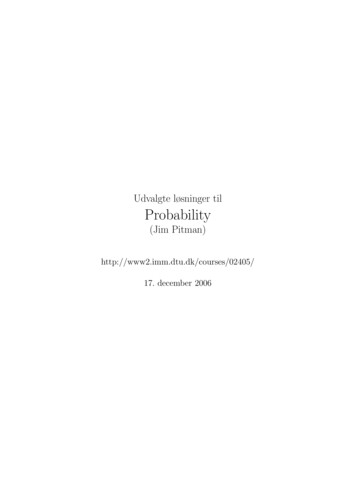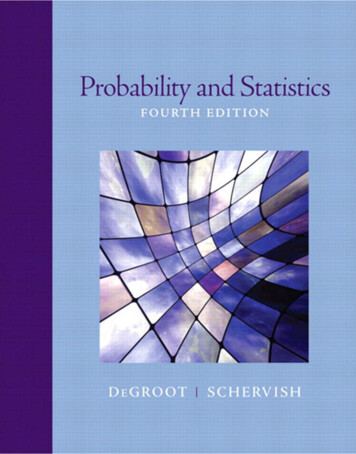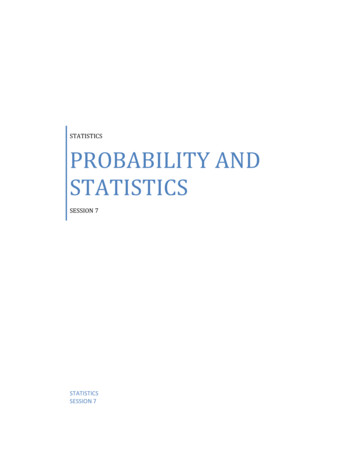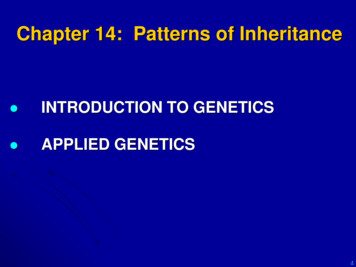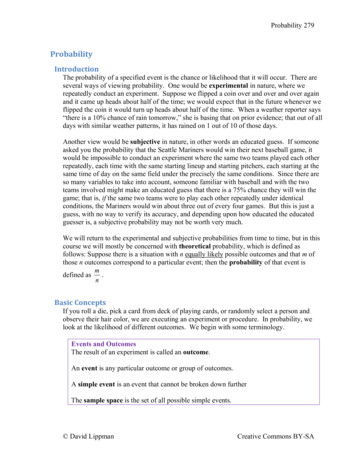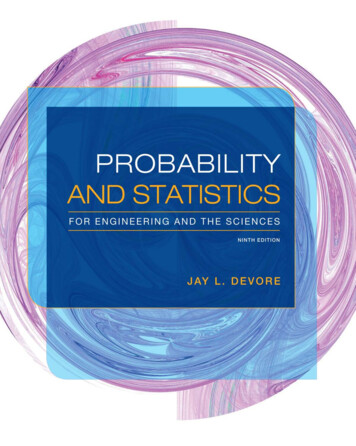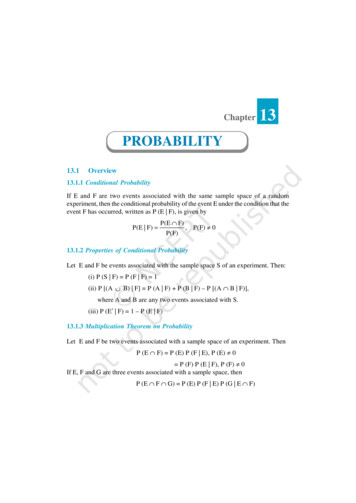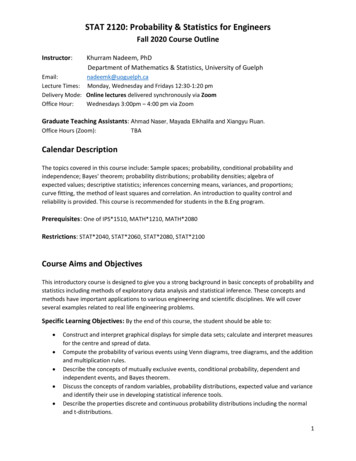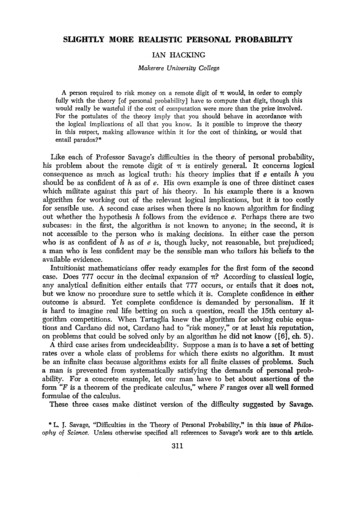
Transcription
SLIGHTLY MORE REALISTIC PERSONAL PROBABILITYIAN HACKINGMakerere U ziversityCollegeA person required to risk money on a remote digit of n would, in order to complyfully with the theory [of personal probability] have to compute that digit, though thismould really be wasteful if the cost of computation were more than the prize involved.For the postulates of the theory imply that you should behave in accordance withthe logical implications of all that you know. Is it possible to improve the theoryin this respect, making allowance within it for the cost of thinking, or would thatentail paradox?*Like each of Professor Savage's difficulties in the theory of personal probability,his problem about the remote digit ofis entirely general. It concerns logicalconsequence as mnch as logical truth: his theory implies that if e entails h youshould be as confident of h as of e. Isis own example is one of three distinct caseswhich militate against this pait of his theory. In his example there is a knownalgorithm for working out of the relevant logical implications, but it is too costlyfor sensible use. A second case arises when there is no Icnown algorithm for findingout whether the hypothesis h follows from the evidence e. Perhaps there are twosubcases: in the first, the algorithm is not known to anyone; in the second, it isnot accessible to the person who is making decisions. In either case the personwho is as confident of h as of e is, though lucky, not reasonable, but prejudiced;a man who is less confident may be the sensible man who tailors his beliefs to theavailable evidence.Intuitionist mathematicians offer ready exaniples for the first form of the secondcase. Does 777 occur in the decimal expansion of n? According to classical logic,any analytical definition either entails that 777 occurs, or entails that it does not,but we know no procedure sure to settle which it is. Complete confidence in eitheroutcome is absurd. Yet complete confidence is demanded by personalism. If itis hard to imagine real life betting on such a question, recall the 15th century algorithm competitions. When Tartaglia knew the algorithm for solving cubic equations and Cardano did not, Cardano had to "risk money," or at least his reputation,on problems that could be solved only by an algorithm he did not know ( [ 6 ] ,ch. 5).A third case arises from undecideability. Suppose a man is to have a set of bettingrates over a whole class of problems for which there exists no algorithm. It mustbe an infinite class because algorithms exists for all finite classes of problems. Sucha man is prevented from systematically satisfying the demands of personal probability. For a concrete example, let our man have to bet about assertions of theform "F is a theorem of the predicate calculus," where F ranges over all well formedformulae of the calculus.These three cases make distinct version of the difficulty suggested by Savage.* L. J. Savage, "Difficulties in the Theory of Personal Probability," in this issue of Philosophy of Science. Unless otherwise specified a11 references to Savage's work are to this article.
312I&?HACKINGThe third one, though it will appeal to logicians, might be discounted by a practicalpersonalist on the grounds that we never do have to risk money over the wholerange of an infinite undecideable class. Hence I shall attend mainly to the firsttwo cases. althoughin mind. The first and second cases" the third will also be kentIdo arise in serious practical matters. Many questions in probability theory are answered by Monte Carlo methotls that yield only probable solutions with a rangeof uncertainty. Yet a computer technologist will often decide to use Monte Carlomethods: both when expensive exact solutions are theoretically available, and alsowhen no algorithm for the exact solution is known. In either case he is rationallydeciding to act against the axioms of personal probability. A slightly more realistictheory must show that his decision is reasonable.Savage fears that any theory which is, in this respect, more realistic, will "entailparadox." This is especially plausible in the first two cases, for although we expect the precise analysis of recursive functions to help with the third, no analysisis already tailored for the other two. The difficulty seems to arise from some featureof what Savage calls "logical implication." Philosophers know, to their cost, thedifliculty of getting any intuitively adequate analysis of relations among logicaltruths. The best known analysis of logical implication, namely C. I. Lewis' theoryof strict implication, says that a self-contradictory proposition entails everything([14], p. 250). Many philosophers balk at that result, but none has circulated analternative which is, at present, widely accepted. It is plausible to guess that attempts to patch up personalism will sink into the same quagmires that have, in myopinion, swallowed up students of entailment.1. A priori and a posteriori reasoning. Plausible though such defeatism is,I shall argue against it. The argument goes near many philosophical quagmires, butwe can skirt most of them in the way which, as Savage reminds us, so many otherphilosophio4 difficulties are evaded by personalism. A main strand in the argument can be sent out at once. Personalism is, says Savage, a theory for policingone's own potential decisions and systems of belief. Hence we distinguish betweenthe theory and what it is about. In logician's parlance personalism is a metatheory.It is about, in part, various beliefs that are represented by propositions. Some aspects of Savage's problem may stem from over-willing acceptance of philosophicaldogmas about propositions and our knowledge of them.In particular I do not believe that the theory should acknowledge any distinctionbetween facts found out by a priori reasoning and those discovered a posterim5.I am not referring to the current controversy as to whether there is a sharp distinction between analytic and synthetic truths. I insist only that actions based ultimatelyupon lcnowledge need not distinguish ways in which the knowledge is acquired.Consider the problem of finding the surface of least area bounded by a closedcurve in space. It is hard to establish even that there is a lcast area. Yet in theearly 19th century the Belgian physicist Plateau could often answer by determiningthe 6lm a soap bubble forms on a closed loop of wire; he knew enough about soapbubbles to be sure the film was of least area. The complete mathematical solutionshad to wait for over a century (141, p. 386). Yet the empirically obtained resultsshould provide as much confidence for practical decisions as the later mathematicalproofs-maybe more, considering several debacles that from time to time occurredin the calculus of variations! What matters to the decision maker is what he knows
SLIGHTLY MORE REALISTIC PERSONAL PROBABILITY313or can find out; philosophical distinctions among the means of discovery are of nomoment.Take a pair of examples directly related to Savage's problem about the remotedigit of IT. Imagine a man taught binary notation, but not even told that it is asystem of numbering. We is taught only the natural ordering of the bina ynumerals. He is also taught how to add and multiply in this notation, although heis not told what the operation means. He is asked to speculate on the relative magnitude of products of pairs of five-digit binary numbers. It does not matter to himmuch; say he risks no money at all, but can make a little every time he is right.His beliefs can be represented by betting odds in the way that Savage has taughtus. Suppose that considering any pair of products of two five-digit binary numbers, his betting rate is 0.2 on the two products being equal, and 0.4 on each ofthe other two alternatives.This man, whom we shall recall from time to time in what follows, is to be compared with another: someone who is first introduced to the mysteries of underground city transport, say that of the city of London. He is aslced questions like,"Are there more stops travelling between Gloucester Rd. and King's Cross on thePicadilly or on the Circle line?" His odds parallel those of the first man, the binarycomputer. The two have much in common. Their betting rates hardly fit the factsas we know them. In each case, an elementary algorithm answers each questionwhich can be put to them; each declines it as too expensive considering the triflinggains. In each case some "insight" short of working out complete answers wouldlead to more profitable betting odds.Despite the parallel, personalism treats one man as sensible and the other as incoherent. We need a theory that puts both on a par. It should also explain whyeach man should find out more before wagering, if investigation is cheap enough.In trying to lessen the fo1ma1 distinction between the two men, a remark of Savage'smay suggests a fallacy we should avoid. He says that "the example about 7c doesnot adequately express the utter impracticality of knowing our own minds in thesense implied by the theory." I believe the example about 7c does not express theirnpracticaIity of knowing our own minds at all: it has nothing to do with knowingour own minds; it is a matter of lcnowing n. And our speculator on binary productsmay know his own mind full well; what he does not know is binary arithmetic.2. Classical personaliisna. Personalists attribute probabilities to events, butSavage's probIem arises out of logical implication, which is a relation betweenpropositions. So it is natural to work in one of the formalisms that attribute probability to propositions rather than to events.Classical personalism offers a theory of rational belief and reasonable decision.A t any moment in his life a man will know a body of facts f . He is interested insome set of propositions. Associated with this set is a Boolean algebra A. Pmbf(h)is to be a number representing the person's personal probability for 11, when heknows f ; for short, his probability given f . In one behavioural analysis, confidenceis measured by the least favourable rate at which the person will bet about h. Thisleads to a well known argument for what I shall call the static assumption of personalism: For any &A, and at least any f c A, Probf(h)is defined and satisfies theprobability axioms. As de Finetti proved, the probability axioms give necessary andsufficient conditions that a person's odds not be open to a Dutch book, i.s. not open
314IAN HACKINGto a book against him which is guaranteed a net gain [7]. Perhaps other argumentsfor the static assumption are more profound. Many readers will prefer those ofF.P.Ramsey's [17] or Savage's ([19], ch. 3 ) . But de Finetti's argument is sofamiliar, so simple, and by comparison so brief that it serves as a convenient reference point for the rest of this paper. I believe each point made in connection withthe Dutch book argument can be transferred to the other famous arguments for thestatic assumption.Probability given facts is not to be confused with conditional probability, whichis defined in the usual way:Prob! ( h e )Probf(h/e) Probf(e)for positive denominators. Conditional probabilities indicate how confident a personknowing only f judges that he would be if he knew e as well. The distinction between probability given facts and conditional probabilities is not found in the usualpersonalist writings. The terminology is copied from an objectivist paper of J.S.Wi1liams ([25], p. 276). Formally the distinction is clear. The probability of h givenf is a primitive to be circumscribed by the axioms of Kolmogorov. Conditionalprobability is defined as above. The latter is extraneous to the system, and introduced solely for convenience; the former is basic.I say the distinction is fundamental to personalism yet personalists never use itexplicitly. They never write "f" as a subscript to probabilities, nor express the ideain other ways. Why then introduce it? Bemuse it will be crucial to our treatmentof Savage's problem, and also because it makes explicit something fundamental tothat part of Savage's theory which leads one to call his work Bayesian. Let meexplain this after stating an implicit assumption of personalists which connects conditional probability with probability given facts. I call it the dynamic assumption:Probfvrel( h ) Prob,(h/e).The meaning is as follows. Suppose I know only f. I judge that if I knew e as well,I would be confident of h to degree p; behaviourally this judgement is shown by theconditional bets I would place. Now I find out that e is the case. The dynamicassumption asserts that now my confidence in h is p, as behaviourally shown in areadiness to place unconditional bets.This assumption is not a tautology for personalism. It is a tautology for theorieslike Harold Jeffreys' [13], where a unique probability is associated with any pairh,e. Those theories do not need our distinction between probability given evidenceand conditional probability. But personalists do need the distinction, and do needthe dynamic assumption.Since the assumption seems never to be stated explicitly in the classic personaliststudies, how dare I say it is needed? Because it is essential to that "model of howopinion is modified in the light of experience" to which Savage refers above. Thisrequires a digression, but it is so important to understanding personalism, and mymodification of it, that the point deserves a section of its own.
SLIGHTLYMO REALISTIC PERSONAL PROBABILITY3 153. Conditional and given. Savage's model of modifying opinion employs Bayes'theorem; that is why we speak of Bayesians today. Savage has stated the theorem"somewhat informally" in the following way ( I use an innocent paraphrase of([go], p. 15).Prob (h/e) a Prob(e/h) Prob ( h )In words, the probability of h given the datum e is proportional to theproduct of the probabiIity of observing e given h multiplied by theinitial probability of k.Well known properties of this theorem lead us to a model of learning from experience. My own catalogue of the properties, guilty of exactly the same confusion asI shall attribute to Savage's presentation, is given in ([9], ch.XII1). The idea ofthe model of learning is that Prob(h/e) represents one's personal probability afterone learns e. But formally the conditional probability represents no such thing. If,as in all of Savage's work, conditional probability is a defined notion, then Prob(h/e)stands merely for the quotient of two probabilities. It in no way represents what Ihave learned after I take e as a new datum point. It is only when we make thedynamic assumption that we can conclude anything about learning from experience.To state the dynamic assumption we use probability given data, as opposed to conditional probability.The conflation of two distinct concepts may explain why people favourable topersonalism can say both that conditional probability is an "extraneous" definednotion, and also that, as D.V.Lindley puts it in discussing an address of Savage's"All probabilities are conditional" ( [20], p. 83).It may seem as if Lindley's position could let us avoid the distinction I have beenurging. I said Jeffreys' interpersonal theory could get along with conditional probabilities taken as primitive. Why cannot the personalist do the same, as Lindley doesin his own recent book [15]? Unfortunately we find the equivocation in a new guise.Lindley gives a betting rate justification of his axioms along personalist lines([IS], Vol.I,pp.32-36). It relies on reading Prob (h/ef) as the rate, all conditionalon f, at which I would bet on h conditional on e. Later in his Bayesian statistics,the same conditional probability symbol represents my confidence or betting rate forh when I know both e and f ; when e is a sample, Prob(h/ef) shows how beliefs are"changed by the sample according to Bayes' theorem" ([IS], Vol.II,p.&).The equivocation can be explained but not excused by the fact that a man knowing e would be incoherent if the rates offered on h unconditionally differed from hisrates on h conditional on e. But no incoherence obtains when we shift from thepoint before e is known to the point after it is known. Thus, suppose to begin withon he, -he,both h and e are uncertain. A man offers odds of p,q,r, and 1 -p-q-rh-e and -h-erespectively. His conditional rates fit in with this. Then e isfound out to be true. The man revises his rates, betting 1 on e, 0 on -e, andp s/p q s on h, and q/p q fs on -h for some positive s. These new ratesshow how much the man has "learned" from e. His learning violates the dynamicassumption. It is non-Bayesian. But since the man announces his post-e rates onlyafter e is discovered, and simultaneously cancels his pre-e rates, there is no systemfor betting with him which is guaranteed success in the sense of a Dutch book. Itis of no avail to express all rates as conditional: then the man's Prob(h/ef) before
316IAN HACKINGlearning e di%ers from his Prob(h/ef) after learning e . Why not, he says: thechange represents how I have learned from e!I am not here quarrelling with the dynamic assumption, although I know of nopersonalist defcnce of it. Probability dynamics is too little studied, although RichardJeffrey's ([13], ch.11) is a good start at clarifying another aspect of the problemwhich I am here ignoring. Patrick Suppes' ([23], sec.4) is well aware of the matterI have just described, although the axiom he proposes does not seem sufficient toguarantee the dynamic assumption. One non-personalist defence of the dynamicassumption can, I believe, be derived from the continuity and differentiability argument of R.T.Cox (151, ch.1) to which Shimony alludes in his essay in the presentissue of Philosophy of Science. But that argument has never been favoured by personalists. And neither the Dutch book argument, nor any other in the personalistarsenal of proofs of the probability axioms, entails the dynamic assumption. Not oneentails Bayesianism. So the personalist requires the dynamic assumption in orderto be Bayesian. It is true that in consistency a personalist could abandon theBayesian model of learning from experience. Salt could lose its savour.4. The betting rate interpretation. Our digression into the concept of probabilitygiven facts was needed for our overall view of Savage's problem and its solution.For we propose a trivially Bayesian treatment of mathematical learning, in agreement with our view that learning mathematical facts, and learning empirical facts,are both learning facts. The model of how learning facts modifies opinion will bethe same in each case, namely Bayesian. We can achieve this only by weakeningthe axioms for personal probability, but in such a way that no practical applicationof the classical theory is impeded. For a hint of how to proceed, re-examine thebetting rate interpretation, where Prob,(h) p if and only if p is the largestnumber such that for any relatively small S I would exchange pS for the right tocollect S if h is true, and nothing if h is false.Under the usual interpretation of a betting rate, de Finetti's theorem is valid:betting rates must satisfy the probability axioms or else be open to a Dutch book.But the usuaI interpretation involves a trifling idealization. In real life betting I willnot collect on h merely if it is true. It must be seen to be true. The bettors (or theirheirs) must find out that h is true, or at worst abide by the decision of a trustedarbiter who claims to know about h. This idea has, I think, been implicit in deFinetti's insistence that we can only bet on hypotheses of the sort that can be settledin finite time. But that insistence is not enough, for only a few of the hypothesesthat can be settled in theory are ever in fact settled. Even if something can be inprinciple settled but in fact never is, there will be no pay-offs.More realistically my personal probability for h must be measured by p when pis the largest number such that I will contract with another party as follows. I agreeto pay him pS if we find out that h is false. He agrees to pay me S in exchange forpS if we find out that h is true. No money changes hands until we settle the truthvalue of h. Of course like any other contract the "we" is less than literal: contractscan be inherited, bought, or adjudicated. But we discard the custom of leaving thestake in the hands of a bookmaker until the issue is settled: that custom is due tohuman dishonesty and has nothing essential to do with betting.
SLIGHTLY MORE REALISTIC PERSONAL PROBABILITY317With this reinterpretation in mind, examine two of the probability axioms, say ina form adapted from Shirnony's [21].(1) If some elements of f logically imply h, then Prob,(h) 1.(2) If some elements of f logically imply that h. and i are incompatible, thenProbf(hVi) Probf(h) f Probf(i).The only other axiom for probabilities in finite algebras says that probabilities lie between 0 and 1. The axioms are sensible for the usual betting rate interpretation, forif my rates fail to satisfy either ( 1 ) or ( 2 ) ,then, in the usual interpretation, a Dutchbook can be made against me. This does not hold for the more realistic interpretation. In the extreme case suppose there is no available way to find out if elementsof f logically imply h; f could even be the null class, and h a proposition of logic.Then, on the basis of knowledge of j there is no absurdity in having a betting rateon h less than 1, nor is there any known way to make a book against me withguaranteed profit. Though sufficient, the probability axioms are not necessary foravoiding a real life Dutch book.John Vickers noticed this and in [24] suggested weakening ( 2 ) . He proposedadditivity only if there is a proof that the incompatibility of h and i follows from f.He rightly said that even this is too strong for strictly personal probability. To extendVickers' line of thought we need to analyse more closely the possible states of affairscontemplated by a decision maker.5. Possibilities. Axioms ( 1 ) and ( 2 ) both use the concept of logical implication.As Shirnony's [21] takes for granted in presenting probability, strict implication isthe appropriate formal analysis of logical implication in this context. C.I.Lewisexplained strict implication in terms of possibility: e - hif it is not logically possiblefor e to be true while It is false ( [ 1 4 ] ,p.124). This implicit falling back on possibility should make us prick up our ears. Aristotle had a scale of modes: impossible,possible, probable, necessary. It is a tradition, which I do not admire, always toconsider this as a scale of logical possibility, logical probability, etc. Savage snappedtradition by going to an opposite extreme: personal probability. Perhaps he getsinto trouble because he is not completely radical. Just as logical probability is related to logical possibility, so personal probability demands a concept of personalpossibility.There is nothing sacred about logical possibility. We Itnow how Quine hasmocked it ( [ 1 6 ] ,ch.1,2). A recent attempt to define what we commonly mean bypossibility argues that though the concept is "objective" it falls short of logical possibility and is an epistemic concept [ l o ] . That work was a by-product of trying todefine "objective" probability short of logical probability. Likewise some conceptof personal possibility should be a by-product of personal probability.6. Personal possibility. The personalist wants to choose among acts, given apartition into possible states of the world. As Savage says, a possible state of theworld is a "possible list of all answers to questions that might be pertinent to thedecision situation at hand." But the partition need not consist of distinct logicalpossibilities. It should consist of states of affairs each of which is "possible to theagent." Of course in English we don't say "possible to him" (and "possible for him"is something different; what [ l o ] calls an M-occussence of the word.) But personal
probability requires the odd ' robable to him" or "probable for him" and personalpossibility will need new locutions too.For me, when is a proposition possible? When I do not know it to be false.Hence p may be possible for me although, to use the rubric of Jaako Hintikka's( [ I l l , p.3), it is not possible for all that I know that p (i.e., p may be possible forme when it is incompatible with facts I do know, so long as I do not know theincompatibility. )What are the objects of personal probability? If, as in Carnap's ([I], p.27),logically equivalent propositions are identical, then propositions cannot be the objects.For h and i may be logically equivalent, and I may know h, yet, because I amignorant of the equivalence, I may not know i; hence -h would not be personaLl ipossible while -i is. This is absurd if personal possibility applies to propositions.No tighter criterion of propositional identity has ever succeeded. Hence we mustcast about for other objects for personal probablity. Sentences are the obviouschoice. When p is an unambiguous sentence that a person understands, I shallspeak of p being possible for him, and of his knowing p. This is not our normalway of speaking, but in the present context the meaning will be quite clear. Wepretend that, as in a formal language, all sentences are unambiguous.To attach knowledge to sentences is a blow against sound epistemology but is finefor personal probability, the theory of a person's choice. One can deliberate amongonly those possibilities expressed in sentences he can understand. Hence we abandonthe idea of choosing within a Boolean algebra of propositions, and think of choosingamong sentences in a language or "personal language" closed under what, in thatIanguage, correspond to the forming of conjunctions, negations, conditionals andalternations.For an artifical example, recall the person comparing products of five-digit binarynumbers. He need never employ any number over 961. Hence he need use onlythe following language. The terms are the first 961 binary numbers and the reor "X" between two braclcetted terms. The atomiccursive result of writingsentences result from writing " " or " " between two terms. The closure of thisunder the Boolean sentential operations would be what I have called a languagewithin which the person forms his beliefs about the problem at hand. It is notBoolean since the equivalence classes of sentential logic are not admitted.It is not realistic to permit unending iteration of sentential operations, for there isan upper bound to the length of the sentences one can understand. A more realisticlanguage" would be the intersection of the closure under sentential operations, with the class of sentences a person understands. This can be characterizedartificially, e.g. by limiting the sentences to 10,000 or fewer symbols. But I knowof no difficulty in personal probability caused by ceaseless iteration, and I know noformal characterization of intelligibility which is not hopelessly artificial. HenceI shall not strive for realism in this matter.We may notice, without elaboration, that tying personal probability to a personallanguage of sentences, or of intelligible sentences, niakes one defect of personalismmore transparent. Much scientific learning consists in devising new hypotheses orforming new concepts. The personalist difficulty over the unexpected hypothesis isexplained in ([9], p.221); Fatrick Suppes examines concept formation and personalism in [22]. Since new hypotheses and new concepts typically lead to newlyintelligible sentences, they lead to a new personal language. So we should restrict" "
319SLIGHTLY MORE REALISTIC PERSONAL PROBABILITYBayesian learning to that learning which occurs when the personal language is unchanged; when experience or thought prompts a change in one's language, quiteanother analysis is called for.7. Knowledge. It is fine to relate personal probability to sentences, but it is notinviting to explain "p is personally possible for me" as "I do not know that p isfalse." For philosophers have never agreed on what knowledge is. They haveagreed, at least since the Gorgias, that only what is true can be known. No othernecessary condition is universally accepted. There is a long tradition of analysingknowledge as justified belief: for a man to know p, it is said, he must have goodreasons for believing that p, must see these reasons to be good reasons, and mustbelieve or even be certain that p. But this tradition is in a bad way, and like manyother people, I suspect it is on the wrong track entirely.The problem of what is knowledge is already a problem for personal probability,as noted by Savage above. Hence we will have achieved our aim of reducingSavage's list of difficulties by one, even if our treatment of the problem about ITtakes-for granted the meaning of "knowledge." But one question we cannot evade.What are the closure conditions of knowledge? Despite the enduring argument ofthe Meno, knowledge is not closed under logical consequence. It is a tribute toSocrates' rhetoric that even today a good many philosophers agree with him, but atmost they can be proposing a new, "divine," sense of knowledge. Using the verb"to know" in anything Iike its customary sense, it is at best a bad joke to say thatonce a student learns Peano's axioms he knows all their conseauences.Yet knowledge must surely have some closure conditions? If a man knows bothp and p 3 q, does he not thereby know q as well? For him not to know q wouldbe for him to betray misunderstanding of the conditional, and hence to show thathe does not know p 3 q after all. So much is a natural conclusion to draw fromLewis Carroll's riddle about Achilles and the tortoise [ 3 ] when taken together withwork like Gilbert RyIe's [18]. Yet closure under modus p m n s leads disasterouslynear to the divine sense of knowledge.I think the solution to this dilemma is to"s
His beliefs can be represented by betting odds in the way that Savage has taught us. Suppose that considering any pair of products of two five-digit binary num-bers, his betting rate is 0.2 on the two products be
